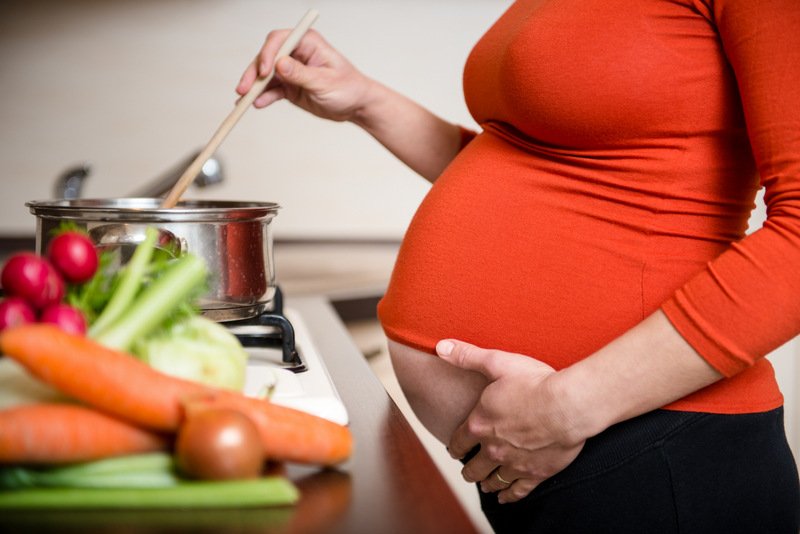
Whether you took the glucola test during your second trimester or took a different route for monitoring blood sugar levels, you may find yourself with gestational diabetes. Gestational diabetes is a serious condition but can be managed naturally (and even reversed!).
- What Is Gestational Diabetes?
- When to Test for Gestational Diabetes
- Gestational Diabetes Prevention
- What Are the Risks of Gestational Diabetes?
- What Is Considered Good Blood Sugar During Pregnancy?
- Treatment for Gestational Diabetes
- How to Monitor and Stabilize Blood Sugar Naturally
- A Real Food Diet for Gestational Diabetes: Bottom Line
What Is Gestational Diabetes? ^
Gestational diabetes (GD) is defined as diabetes that is first diagnosed during pregnancy. It can also be called “insulin resistance” or “carbohydrate intolerance” during pregnancy.
These last two definitions are most accurate because GD means a woman can’t tolerate large amounts of carbohydrates without getting high blood sugar.
Some practitioners say that GD is a predictor for later diabetes. In reality, GD may be a sign of early pre-diabetes. That means GD may be a blessing in disguise because it can alert us to underlying blood sugar issues.
All women have slight insulin resistance during pregnancy. This is because blood sugar is the best way to feed a growing baby and very low blood sugar could be dangerous. In nature, famine is an occasional reality, so this insulin resistance is a good and protective thing. But in our society, with simple carbohydrates more accessible than complex ones (or healthy meats and vegetables), insulin resistance during pregnancy is unnecessary and potentially problematic.
When to Test for Gestational Diabetes ^
Typically doctors test for diabetes in the second trimester (around 24-28 weeks). This is because GD was thought to only occur at this time when placental hormones and insulin resistance surge.
But some research shows that earlier testing is beneficial.
Women with GD have a 7 times higher risk of developing type 2 diabetes later in life, according to research published in the Lancet.
This research implies that GD is not just a phenomenon of pregnancy and is related to something already going on in the body.
In one study published in Diabetes Care, a first trimester A1c reading of 5.9% or higher was indicative of GD later in the pregnancy. In fact, this reading accurately predicted the development of GD 98.4% of the time.
It would make sense then, to monitor blood sugar early and often.
Gestational Diabetes Prevention ^
If gestational diabetes is a sign that the body isn’t able to handle carbohydrates well (during pregnancy and before) it would make sense that GD is related to diet and lifestyle factors. Research shows that a healthy lifestyle reduces the risk of gestational diabetes.
- A combination of exercising, healthy eating, and not smoking reduced GD by 41 percent in a 2014 cohort study.
- A 2004 case-control study found that exercise before conception and during early pregnancy reduced the risk of GD by as much as 78 percent.
- Protein intake in the first trimester may also protect against GD, research in a 2010 study shows.
- Healthy weight preconception is also important. A study found that healthy weight before conceiving reduces GD risk.
- One study found that women who were deficient in vitamin D were significantly more likely to get GD.
Also, have your A1c checked early in pregnancy. As described above, this can accurately predict whether you will develop GD and you can make dietary and lifestyle changes early.
What Are the Risks of Gestational Diabetes? ^
Untreated gestational diabetes can have unfortunate consequences for both mom and baby. Complications related to GD include:
- Preeclampsia, preterm birth, and stillbirth
- Birth defects
- Macrosomia (being born large at birth)
- Shoulder dystocia (shoulders are stuck in the birth canal)
- Hypoglycemia (baby’s blood sugar is too low at birth)
- Jaundice
- Permanent changes to baby’s blood sugar regulation and metabolism
One of the most concerning risks of gestational diabetes is the last bullet point. When a baby is exposed to high blood sugar in the uterus its pancreas has to produce more insulin to compensate. This can cause an accumulation of fat on the body and in the fetal pancreas, according to this HAPO study. This accumulation of fat predisposes the baby to metabolic issues later in life.
Studies show that children who are exposed to gestational diabetes in the womb are much more likely to have blood sugar issues and suffer from obesity.
So, healthy blood sugar during pregnancy is important for not only a healthy pregnancy and delivery but for baby’s lifetime health!
What Is Considered Good Blood Sugar During Pregnancy? ^
If healthy blood sugar is so important, we need to know what healthy blood sugar is! It looks like the answer is not so clear cut though.
Some babies born with macrosomia (large at birth) are born to women with undiagnosed gestational diabetes. But the majority of babies born with macrosomia are born to women with no gestational diabetes but who suffer from obesity. This information is making some researchers of a 2011 review question what a healthy blood sugar really is.
The above review found that blood glucose levels in normal pregnancy (with no obesity) is lower than the level recommended for those with gestational diabetes. In other words, if you end up with gestational diabetes and you work to keep your blood sugar within the recommended range, you could still end up with complications from gestational diabetes. Even mild elevation in blood sugar can be problematic.
It makes more sense to try to align blood sugar levels with those of normal pregnancy. For example, instead of trying to keep fasting blood sugar below 90 to 95mg/dl, which is what is recommended by the American Diabetes Association, it may be better to keep it within the range of 70.9 +/- 7.8mg/dl.
Treatment for Gestational Diabetes ^
Luckily, even conventional treatment suggests a healthy or balanced diet and exercise before resorting to insulin or medications. Unfortunately, the kind of diet conventional healthcare providers recommend may leave some room for improvement.
Conventional wisdom tells us that whole grains (like whole grain bread) and dairy (especially milk) are healthy foods. In reality, both of these provide a large amount of carbohydrates and very little nutrition (raw milk is okay in moderation if it doesn’t spike your blood sugar).
Because carbohydrates are so important during pregnancy many clinicians are wary of restricting pregnant women’s carbohydrate intake. It’s generally accepted that pregnant women should be no less than 175 carbohydrates each day. This guideline is followed for women with gestational diabetes as well.
The concern is that starvation ketosis or diabetic ketoacidosis can be harmful in pregnancy. However, research published in Diabetes shows that low-level pregnancy ketosis is common and does not carry the same risks including fetal brain development.
This makes sense when you think about the biological reason that women have slight insulin resistance. Pregnancy insulin resistance is the protection against dangerously low blood sugar.
Here is the difference between dangerous ketosis and normal ketosis:
- Starvation ketosis – This occurs when glycogen stores are used up and the body resorts to ketones for energy. This can happen as early as 12 hours after the last meal but often takes 3 to 12 days to become serious.
- Diabetic ketoacidosis – This is a serious condition when blood sugar and insulin are not managed properly in diabetics.
- Ketosis or pregnancy ketosis – This is a normal part of being human. For example, we enter ketosis when we stop eating at night and go to sleep until breakfast. In pregnancy, ketosis is normal too. Pregnant women who suffer from morning sickness often go in and out of ketosis based on what they can tolerate eating. Ketosis is even more common in late pregnancy when there’s not as much room in the stomach. Babies in the womb need ketones and glucose to grow!
Bottom line: If our bodies could not adapt to times when there were less than 175g carbohydrates available every day we would not have survived very long. The bigger problem seems to be when carbohydrates are too easily available, according to researchers of a 2005 study. They found that a low-glycemic index diet reduces the likelihood that a pregnant woman will need insulin.
How to Monitor and Stabilize Blood Sugar Naturally ^
There are three main things you need to do to make sure your blood sugar is in a healthy range. The first thing is to monitor your blood sugar in the morning (fasting) and after each meal. This will give you information to figure out how certain foods affect your blood sugar.
The next is to exercise regularly. Exercise lowers blood sugar, so it’s especially important for those who are having trouble lowering blood sugar levels. The American Congress of Obstetricians and Gynecologists (ACOG) recommend 30 minutes a day.
Lastly, eating a healthy diet is vital for keeping blood sugar under control.
A Real Food Gestational Diabetes Diet
Restricting carbohydrates isn’t the only dietary consideration women with gestational diabetes need to make. The diet as a whole needs to be looked at and not just one part. Additionally, there are many different kinds of carbohydrates and some are better than others. Here’s a look at what a gestational diabetes diet should look like:
- Protein: Most women need 80+ grams of protein every day for a healthy pregnancy. Protein helps regulate blood sugar and is essential for baby’s growth. Healthy sources of protein include pastured eggs, meat/poultry, butter, wild caught fish, and gelatin or collagen (best from bone broth).
- Healthy fats: Consuming adequate fats is vital to baby’s organ and brain development and is important for blood sugar regulation. Healthy sources include meat (including red meat), butter, eggs, olive oil, coconut oil, nuts, limited dairy, etc.
- Vegetables and Fruits: Vegetables and fruits have a variety of vitamins, minerals, and fiber that are helpful during pregnancy. The fiber is especially important in regulating blood sugar.
- Water: Adequate water Intake supports the blood volume increase that happens during pregnancy as well as replenishes the amniotic fluid. But it’s helpful for regulating blood sugar too. Water dilutes the amount of sugar in the bloodstream. Around a gallon, a day is a good rule of thumb.
- Moderate to low carbohydrates from healthy sources – Carbohydrates from healthy sources like sweet potatoes and other starchy vegetable are okay. However, if you need to restrict carbohydrates further, stick with non-starchy vegetables, which also provide carbohydrates. Anything with a high glycemic load (like fruit juice or anything with added sugar) should be avoided altogether (not just during pregnancy!).
The number of carbohydrates each woman should eat will vary. A good way to gauge what’s right for you is to track your blood sugar levels throughout the day in relation to your regular diet. Then you can make adjustments based on what you find. One way to keep track of the kinds of foods you are eating is to make a meal plan (I use Real Plans) which will help you plan healthy meals and can help you remember what you have eaten recently.
More Tips for Keeping Blood Sugar Stable
What you eat isn’t all you need to think about. How you eat can affect blood sugar too. Here are some more tips for getting blood sugar under control during pregnancy:
- Eat carbohydrates along with healthy protein and fat to balance blood sugar
- Get outside! Or at least take a vitamin D supplement. Many midwives and doctors will test your vitamin D levels during pregnancy so you will know how much to supplement.
- Choose full fat, pastured dairy products, but keep them in moderation.
- When you eat starchy foods (like sweet potatoes) eat them in moderation along with healthy protein and fat.
- Spread your servings of carbs throughout the day. For example, have fruit with breakfast, squash with lunch and sweet potatoes with dinner. Try to avoid eating carbs on their own as a snack.
- Keep tabs on how different foods and different combinations of foods affect your blood sugar throughout the day.
The biggest take away is to monitor how food affects your blood sugar and adjust as needed.
A Real Food Diet for Gestational Diabetes: Bottom Line ^
Having any kind of pregnancy complication can cause some anxiety. No one wants to have gestational diabetes. But being informed and taking early steps to help prevent gestational diabetes can help you avoid blood sugar issues during pregnancy and beyond.
Have you ever been diagnosed with GD? What blood sugar regulating tips worked for you?
Sources
- Bellamy, L., Casas, J. P., Hingorani, A. D., & Williams, D. (2009, May 23). Type 2 diabetes mellitus after gestational diabetes: A systematic review and meta-analysis. Retrieved from https://www.ncbi.nlm.nih.gov/pubmed/19465232
- Hughes, R. C., Moore, M. P., Gullam, J. E., Mohamed, K., & Rowan, J. (2014, November). An early pregnancy HbA1c ≥5.9% (41 mmol/mol) is optimal for detecting diabetes and identifies women at increased risk of adverse pregnancy outcomes. Retrieved from https://www.ncbi.nlm.nih.gov/pubmed/25190675
- Zhang, C., Tobias, D. K., Chavarro, J. E., Bao, W., Wang, D., Ley, S. H., & Hu, F. B. (2014, September 30). Adherence to healthy lifestyle and risk of gestational diabetes mellitus: Prospective cohort study. Retrieved from https://www.bmj.com/content/349/bmj.g5450
- Dempsey, J. C., Butler, C. L., Sorensen, T. K., Lee, I. M., Thompson, M. L., Miller, R. S., . . . Williams, M. A. (2004, November). A case-control study of maternal recreational physical activity and risk of gestational diabetes mellitus. Retrieved from https://www.ncbi.nlm.nih.gov/pubmed/15533588
- Kim, H., Toyofuku, Y., Lynn, F. C., Chak, E., Uchida, T., Mizukami, H., . . . German, M. S. (2010, July). Serotonin regulates pancreatic beta cell mass during pregnancy. Retrieved from https://www.ncbi.nlm.nih.gov/pubmed/20581837
- Kim, S. Y., England, L., Wilson, H. G., Bish, C., Satten, G. A., & Dietz, P. (2010, June). Percentage of gestational diabetes mellitus attributable to overweight and obesity. Retrieved from https://www.ncbi.nlm.nih.gov/pubmed/20395581
- Zhang, C., Qiu, C., Hu, F. B., David, R. M., Dam, R. M., Bralley, A., & Williams, M. A. (2008). Retrieved from https://www.ncbi.nlm.nih.gov/pmc/articles/PMC2582131/
- Gestational diabetes. (2017, April 28). Retrieved from https://www.mayoclinic.org/diseases-conditions/gestational-diabetes/symptoms-causes/syc-20355339
- Schaefer-Graf, U. M., Buchanan, T. A., Xiang, A., Songster, G., Montoro, M., & Kjos, S. L. (2000, February). Patterns of congenital anomalies and relationship to initial maternal fasting glucose levels in pregnancies complicated by type 2 and gestational diabetes. Retrieved from https://www.ncbi.nlm.nih.gov/pubmed/10694330
- Holder, T., Giannini, C., Santoro, N., Pierpont, B., Shaw, M., Duran, E., . . . Weiss, R. (2014, November). A low disposition index in adolescent offspring of mothers with gestational diabetes: A risk marker for the development of impaired glucose tolerance in youth. Retrieved from https://www.ncbi.nlm.nih.gov/pubmed/25168408
- Boney, C. M., Verma, A., Tucker, R., & Vohr, B. R. (2005, March). Metabolic syndrome in childhood: Association with birth weight, maternal obesity, and gestational diabetes mellitus. Retrieved from https://www.ncbi.nlm.nih.gov/pubmed/15741354
- Hernandez, T. L., Friedman, J. E., Pelt, R. E., & Barbour, L. A. (2011, July 01). Patterns of Glycemia in Normal Pregnancy. Retrieved from http://care.diabetesjournals.org/content/34/7/1660.full
- Coetzee, E. J., Jackson, W. P., & Berman, P. A. (1980, March). Ketonuria in pregnancy–with special reference to calorie-restricted food intake in obese diabetics. Retrieved from https://www.ncbi.nlm.nih.gov/pubmed/6769724
- Kopp, W. (n.d.). Role of high-insulinogenic nutrition in the etiology of gestational diabetes mellitus. Retrieved from https://www.ncbi.nlm.nih.gov/pubmed/15533622
- Exercise during pregnancy and the postpartum period. ACOG Technical Bulletin Number 189–February 1994. (1994, April). Retrieved from https://www.ncbi.nlm.nih.gov/pubmed/7913067




